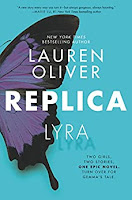Replica by
Lauren Oliver is one of those books I found on my Kindle--I bought it on sale, didn't read it right away, and didn't recall much about it when I finally began it. And I didn't understand the novelty of its structure. At the end of each chapter, I found instructions to follow a link to get to a chapter about another character. But only if I wanted to. I could choose to keep reading about the main character I started with, and then, presumably, read about the other character all at once.
To more clearly explain this, here's the description from Oliver's website: "Replica is a “flip book” that contains two narratives in one. Turn the
book one way and read Lyra’s story; turn the book over and upside down
and read Gemma’s story. The stories can be read separately, one after
the other, or in alternating chapters."
Point-of-View Switches
Though I'm always complaining about books with point-of-view switches, I chose to keep going back and forth between Lyra and Gemma's stories. Oddly enough, I thought that worked very well, especially when you consider that after reading a chapter from one character's point-of-view, I'd often read another chapter covering the same material, but from the other character's point-of-view. My complaint about point-of-view switches is that I feel they slow narrative drive. I didn't feel that was the case here, even though you'd think that covering the same material twice would do just that.
That Teen Girl-Boy Thing
Both Lyra and Gemma have romantic involvements. In fact, for one of them there is the possibility of a torn-between-two-lovers situation. Romance, romance everywhere is something, like point-of-view switches, that usually annoys me no end. Romance in books that are not actually romances usually strikes me as a gimmick, an awkward add-on, a distraction. Especially in thrillers or adventures where characters are in danger, the logic of dropping everything for a love scene is just lost on me.
In the case of Replica, though, the romance is less like romance and more like an attraction, a drive that the characters have no control over. That was particularly so in Lyra's case. A stage-of-life attraction to the opposite sex may be what's happening during adolescence. It makes more sense to me than sixteen-year-old romances.
Are We Talking A Serial?
Replica leaves readers with the impression that there is more to come. And there is what's called a "companion novel,"
Ringer, that appears to involve the same characters after the events in
Replica. But
Replica has a satisfying ending. One phase of the story, at least, is ending. There isn't the feeling that this is a serial, that readers are left dangling and will have to buy another book to feel any kind of satisfaction.
I hate when that happens.
So Replica is both a good read and an interesting example of how a number of writing issues that I really dislike can be made to work.

No comments:
Post a Comment